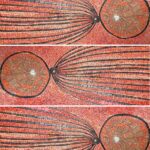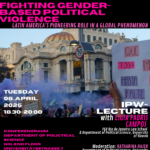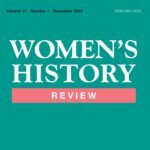 Zweites Forum Geschlechtergeschichte/n für Dissertant:innen und Forscher:innen in Österreich und angrenzenden Regionen; Heidrun Zettelbauer und Katharina Scharf (Graz)
Zweites Forum Geschlechtergeschichte/n für Dissertant:innen und Forscher:innen in Österreich und angrenzenden Regionen; Heidrun Zettelbauer und Katharina Scharf (Graz)
Zeit|Time: 23.-24.10.2025
Ort|Venue: Univ. Graz
Einreichfrist|Proposals und Anmeldung|Registration by: 27.04.2025 (Formular als PDF)
„Geschlechtergeschichte ist gekommen, um zu bleiben“. Ganz im Sinne dieses Eröffnungszitats der ersten Ausgabe des Forums 2024 in Innsbruck zielt die Weiterführung des Forums Geschlechtergeschichte/n in Graz im Oktober 2025 auf die weitere nachhaltige Vernetzung innerhalb der Geschlechtergeschichte in Österreich und angrenzenden Regionen ab. Im Zentrum des Workshops stehen erneut die Diskussion von Dissertationsprojekten in den Bereichen Geschlechtergeschichte, Queer History und intersektionale Geschichte sowie der strukturierte Austausch mit Geschlechter- und Queerhistoriker:innen untereinander. Das Forum bietet wieder einen Raum für die Diskussion von – im weitesten Sinne – geschlechterhistorisch ausgerichteten Dissertationsprojekten aus allen Epochen und historischen Teildisziplinen. Darüber hinaus widmet sich das Forum erstmals auch einem Schwerpunktthema, … weiterlesen (PDF).
Gender Histories: Spaces and Relationships
“Gender history is here to stay.” In line with this opening statement from the first edition of the Forum in 2024 in Innsbruck, the continuation of the Forum Gender Histories in Graz in October 2025 aims to strengthen further sustainable networking within gender history research in Austria and neighboring regions. The workshop will once again focus on discussing dissertation projects in the fields of gender history, queer history, and intersectional history, as well as facilitating structured exchanges between gender and queer historians. This year’s Forum will again provide a space for discussing dissertation projects broadly focused on gender history across all historical epochs and subfields. Read more … (PDF)
Programm des Ersten Forums Geschlechtergeschichte/n im Oktober 2024 in Innsbruck (Web)

 „Queergelesen“ Spezial: FrauenGenderBibliothek Saar und AK Queer der Univ. des Saarlandes
„Queergelesen“ Spezial: FrauenGenderBibliothek Saar und AK Queer der Univ. des Saarlandes  IPW-Lecture: Department of Political Science (IPW), Univ. of Vienna
IPW-Lecture: Department of Political Science (IPW), Univ. of Vienna  Special Issue of Women’s History Review; Co-Editors Susan R. Grayzel (Utah State Univ.) and Nicoletta F. Gullace (Univ. of New Hampshire)
Special Issue of Women’s History Review; Co-Editors Susan R. Grayzel (Utah State Univ.) and Nicoletta F. Gullace (Univ. of New Hampshire)  Jahrestagung des Netzwerks GeQuInDi 2025 an der Univ. Bayreuth
Jahrestagung des Netzwerks GeQuInDi 2025 an der Univ. Bayreuth  Zentrum für transdisziplinäre Geschlechterstudien (ZtG), Humboldt-Univ. zu Berlin
Zentrum für transdisziplinäre Geschlechterstudien (ZtG), Humboldt-Univ. zu Berlin  Sexuality Research Network of European Sociological Association: ESA RN 23 Sexuality Mid-Term Conference
Sexuality Research Network of European Sociological Association: ESA RN 23 Sexuality Mid-Term Conference